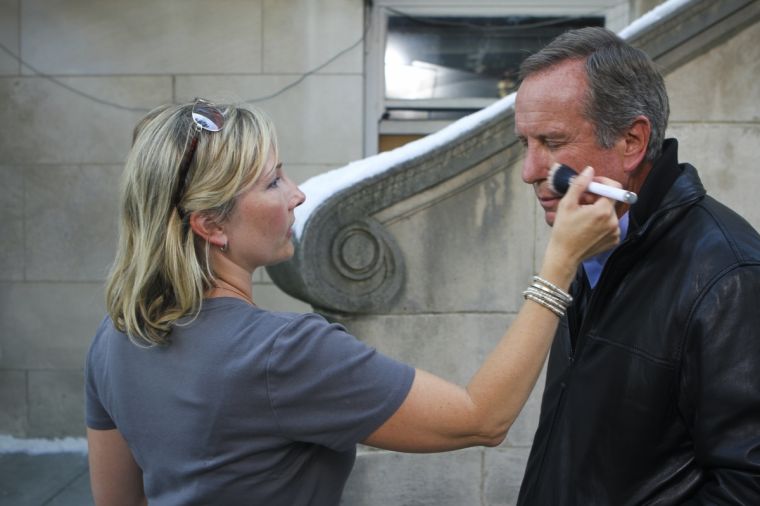Does God ever give us more than we can handle? Bob Russell on suffering

Following the success of 'Heaven is for Real' and 'God's not Dead', another feature-length film tackling biblical truth has been released.
'Acts of God' tells the story of seven lives connected through the tragic death of a young girl, and deals with issues of hardship and suffering head on.
With real, raw storytelling, the movie isn't afraid to wrestle with the big questions, and look at how authentic faith is lived out in the midst of tragedy and unbearable grief.
City on a Hill, a Christian production company based in Louisville, Kentucky, is behind the film, which stars real-life pastor Bob Russell who has also produced six corresponding small-group studies for churches. He caught up with Christian Today to share about his own experiences of grief, and the importance of walking alongside those dealing with tragedy.
CT: What compelled you to get involved in this project?
BR: City on a Hill wanted to do a movie about why God allows so much pain in the world, which is a heavy subject, and asked me to partner with them in producing the movie and also some materials to go alongside it, and I agreed to do so.
I'm 70 years old - I retired from my job as a pastor in 2006 - and I didn't retire just to play golf and goof off, but when they asked me to partner with them, even the teaching part was going to be a stretch. It's out of my comfort zone; I'm accustomed to speaking behind a podium, not in a hospital or on a street.
Then they told me there's a part in the movie for a preacher, and it would make for a smoother transition if I was that preacher. I said 'Wait a minute! That is not my gift!' They told me that they wanted me to be myself, and that I should just try. So I said I would, with one condition: I didn't want to be hokey!
So I tried it out and found out fast that being myself wasn't good enough, so I did it again. The more I did it, the easier it was because every one of these situations in the film, I've been in a similar situation in life; so I just recalled how I responded and how I reacted.
CT: Would you mind sharing a couple of those real-life experiences with us?
BR: When I was in my early 20s, the preacher of my home church drowned at a Sunday school picnic. Everyone was there including his wife and two teenage daughters, his dad and his brother. When they dragged his body to shore it was just horrific, and I had to go and tell his 14 year old son who'd stayed home with the flu that day that his dad had died. It was so hard, and was one of the first times that I found myself asking, 'Where is God? Why would he let that happen?'
In ministry I've been faced with suffering many times, but in my personal life 18 years ago, my wife had a stroke. At first it looked like she'd be okay, and then in the middle of the night she had a terrible seizure and then had a series of seizures and reactions and for about two weeks we didn't know if she would live or die. In that time I was calling to God for help; wondering why he'd let my wife have a stroke at only 58-years-old. Thankfully she recovered and is living to this day, but that was a tough time.
CT: Is suffering really an 'Act of God'?
BR: I think originally City on a Hill chose that title because insurance companies refer to tragic events of nature as 'acts of God'; meaning an uncontrollable tragedy that comes our way. The producers thought about putting a question mark after the title, but if we permit God to work in our life then he can use tragedies for our good.
It's like the story of Joseph in the Old Testament, where he says to his brothers, "you meant evil against me, but God meant it for good". If we allow tragedies to deepen us, mature us, humble us and help us minister to others, then there can be acts of God brought out of our tragedies.


CT: Why do you think churches are afraid to explore suffering?
BR: There are a couple of reasons: I think sometimes we're after easy answers. We like to fix people, and we like 'How to' books: how to end depression; how to fix your marriage; how to stop worrying. But when people come through deep hurt there is no easy fix, and no easy explanation, so it's hard to preach something with loose ends!
Also, we know that whenever we deal with the subject of suffering, there will be hurting people in the audience; we'll be touching on fresh wounds. It can sometimes make people feel worse, because the pain is too tender.
In the church I grew up in a family lost their 12-year-old daughter, and her favourite song was "I come to the garden alone". Every time that song was sung the mother would get up and walk out of church; she was so overwhelmed with grief. So the girl's grandma went through the whole church building and tore that page out of every hymnal in the hopes of never singing the song again. We sometimes don't touch on the subject of suffering because we're so often afraid of reopening a wound.
CT: The tagline of the movie is: "Sometimes God gives us more than we can handle...alone" – can you expand on what that means?
BR: We often quote that scripture; saying God won't test beyond our means. But that passage goes on to say that he will make a way to escape, and that way to escape is having Jesus Christ in your life to reinforce you, and also hopefully you'll have Christian friends to bear you up as well. The Bible says to the Church that if one member suffers, we all suffer with them, so there's strength to be received by the fellowship of the Saints.
Sometimes God gives us more than we can bear alone, but we can turn to him and be given his strength.
CT: The film focuses on the importance of being real; not giving people flippant, throwaway one-liners but really walking with them through grief. What should the Christian response be to suffering? How can we walk alongside people who are in terrible circumstances?
BR: We have to give people space to be angry; people will say even blasphemous things when they're angry at God and it's not the time to count or debate, but to give space. Emotional questions aren't resolved with theological answers.
We worry so much about saying the wrong thing, when really we just need to show up. We had a tragedy at my church where two teenage boys were killed in an automobile accident and there was such a long line to see the family that it took two hours to queue up. We had an intern from Poland who stood in line for two hours, but was so choked up that he couldn't say anything to the boy's father and just burst into tears. He then got back in line and waited another two hours to say "I'm sorry; I'm going to pray for you".
The boy's father said that expression of love and care meant more to him than the preachers who quoted scripture, and so it was a lesson to me to teach that people don't need a lot of scripture in that very moment of suffering, they just need somebody there to weep with them.
CT: And finally, how can we have hope in a world filled with such suffering?
BR: Jesus Christ is our only hope; it seems to me that there's more and more pain as I get older, but we should expect that because Jesus said that in the last days the love of many will grow cold because of the increase of wickedness.
But rather than being filled with despair at our unravelling world, we should be reminded of our ultimate hope – our blessed hope – that Jesus Christ will return; he will wipe every tear from our eyes and make things right.
'Acts of God' is out on DVD across the US now. Watch the trailer below:











